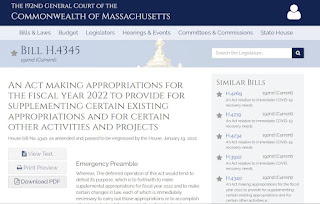Today, the House and Senate passed An Act allowing humane transportation of K9 partners, also known as Nero’s Law, which would ensure law enforcement officers’ K-9 partners receive life-saving medical attention and transport if injured in the line of duty. The bill responds to the tragic events that took the life of New Bedford-native and Yarmouth Police K-9 Sergeant Sean Gannon and severely injured his K-9 partner, Nero.
“Providing emergency medical services to police dogs injured in the line of duty is both compassionate and appropriate, especially in light of what we're asking them to do,” said Senate President Karen E. Spilka (D-Ashland). “Service dogs play a necessary role in effective law enforcement operations, and they deserve our support. I want to thank Senator Montigny for his hard work and attention to this issue, Chair Rodrigues, and Senators Timilty and Cyr for their advocacy and collaboration on this legislation, as well as Speaker Mariano and my colleagues in the House for getting this important bill to the governor’s desk.”
“K-9 police dogs provide several indispensable services to the Massachusetts police force, and the Commonwealth as a whole. Given the sometimes dangerous jobs that police dogs are asked to undertake, providing them with any necessary emergency medical care is our moral responsibility,” said House Speaker Ronald J. Mariano (D- Quincy). “I want to thank Chair Michlewitz, Chair González, and Representative Xiarhos for the efforts they made to ensure the passage of Nero’s Law, as well as Senate President Spilka and my colleagues in the Senate for advancing this critical legislation.”
In April 2018, Sergeant Gannon was shot and killed while serving a warrant in the Town of Barnstable. Despite the multiple empty ambulances on site, Nero, who had been shot and severely injured, had to be rushed to the animal hospital in the back of a police cruiser. Current Massachusetts law prohibits emergency medical personnel from treating and transporting animals. Fortunately, Nero survived his injuries, but the inability to transport him showed that reform was needed to honor working dogs who risk their lives every day to serve the Commonwealth.
Nero’s Law would authorize emergency medical service personnel to provide emergency treatment and transport of K-9 partners. This includes basic first aid, CPR, and administering life-saving interventions such as naloxone.
“K9 officers like Nero are selfless heroes who endure extreme danger in order to keep us safe,” said Senator Mark Montigny (D-New Bedford), lead sponsor of the bill. “We must honor their loyalty and service by ensuring EMS personnel can provide basic treatment and transport should they sustain serious injuries. As a native son of New Bedford, Sergeant Gannon, and by extension his K9 partner Nero, is forever a beloved part of our community. The Gannon family has been a tremendous force in ensuring this bill got done, inspiring myself and others to fight for this legislation every day. We hope this law helps honor their son’s legacy,” said Senator Mark Montigny, lead sponsor of the bill.”
“I’d like to thank Speaker Mariano, Ways and Means Chair Michlewitz, Public Safety Chair Gonzalez, and Minority Leader Jones for their leadership in getting this bill passed in the House this session,” said Representative Steve Xiarhos (R–Barnstable), who sponsored Nero’s bill in the House. “As a former Deputy Chief of Police who was there on the day K9 Nero was shot, I know personally how important this legislation is. We need to send a clear message to first responders throughout the Commonwealth that we support them and their mission.”
“Sergeant Sean Gannon was a dedicated officer of the Yarmouth Police Department known for his restraint and his quiet but firm sense of right and wrong. His tragic murder — and the life-threatening injuries sustained by his canine Nero — left the Cape and Islands in shock and grieving,” said Senator Julian Cyr (D-Truro). “We rely on canines to serve alongside police officers to go where we cannot, seek out what we cannot detect, and search for the vulnerable in their most trying moments, yet existing law prohibits emergency responders from treating and transporting police canines like Nero when they are most in need. I’m proud that the Legislature is honoring Sergeant Gannon’s legacy and his example by protecting our canine friends who have been our companions and partners in public safety and so much more.”
“I am grateful that Nero’s Law has been enacted. Each and every day, law enforcement professionals, including police canines, put their lives on the line to protect the citizens of the Commonwealth. It is crucial that our first responders are given the ability to treat them when they are wounded in the line of duty. Our first responders are now able to provide emergent care to wounded police canines as a result of this legislation,” said state Senator Walter F. Timilty (D-Milton), Senate Chair of the Joint Committee on Public Safety and Homeland Security. “Listening to heartfelt testimony during our public hearings on this bill, I was reminded of the important, unique, and strong bond between a police officer handler and his or her police canine. This is a great day for the law enforcement community.”
"Thanks to the Speaker and members of the Public Safety Committee for advancing Nero's Law to the Governor,” said Representative Carlos González (D-Springfield), House Chair of the Committee on Public Safety and Homeland Security. “Our K-9 officers are heroes, and today we honor all those who have been injured or have lost their lives in the line of duty to protect the public. A special gratitude to Denise and Patrick Gannon for their dedication and advocacy."
Nero’s Law now advances to the Governor’s desk for consideration.
 |
| Legislature Approves Nero’s Law |















